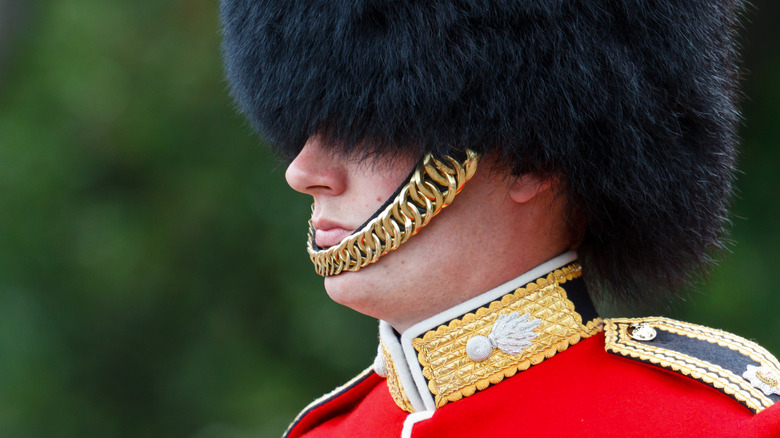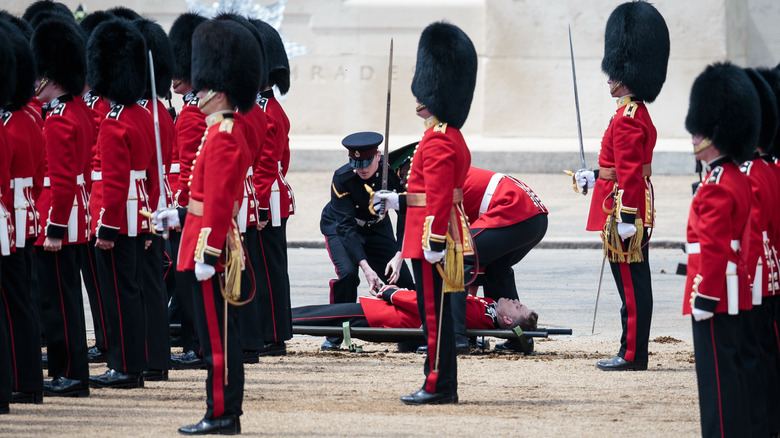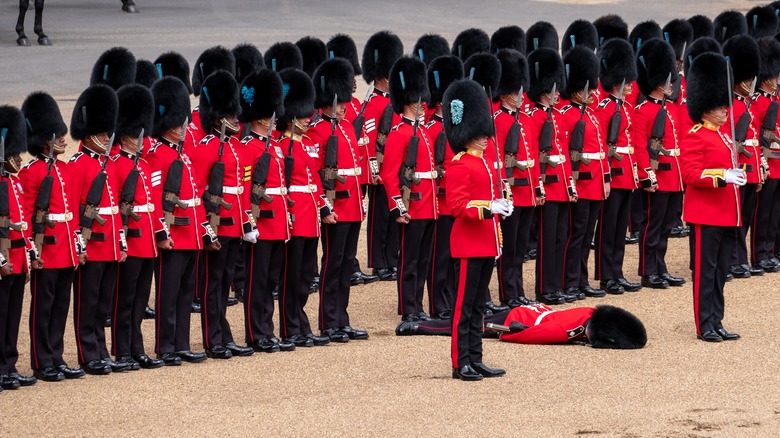Fainting Among The Queen's Guard Is More Common Than You Think
According to We Are The Mighty, the Queen's Guards have been protecting royal residences, including Buckingham Palace, since 1660. Most importantly, the Queen's Guards have a duty to protect the royal family and the ruling monarch. Changing The Guard notes that this tradition goes back to the reign of Henry VII, who ruled from 1485 until 1509. Insider reports that the Queen's Guard is recognizable for their famed uniforms that consist of a long-sleeved red tunic and a tall, black bearskin hat. As they stand guard while carrying a rifle, they are not allowed to eat, sleep, sit, or lay down. Needless to say, this job, although honorable, is anything but easy.
The Independent writes that one guard recently fainted as he stood by the late Queen Elizabeth II's coffin as she lay in state at Westminster Hall. This prompted the BBC to stop its live broadcast of the historic event. The New York Post states that moments before his collapse, the guard was seen stepping off the platform where the queen's coffin is currently laying. He appeared to be shaky but ultimately returned to the platform, where he subsequently fainted and hit the floor. Per the Daily Mail, mourners paying their respects to the queen audibly gasped when this occurred. The guard, however, was provided with help. As Hello! Magazine explains, this is nothing new, given the amount of physical strain the guards endure.
The Queen's Guard stands in one position for hours
Per Hello! Magazine, it's likely that the Queen's Guard standing over her coffin fainted, given his long shift. The publication explains that although the guards change position every 20 minutes, they have to stand still for a whopping six hours while they guard the four corners of the queen's coffin. In 2019, Major Iain Parsons, a cardiologist with the Royal Army Medical Corps, told CBS News why a fainting spell like this can occur. He stated, "Standing for prolonged periods of time, still, that puts you at increased risk." In addition, heat and the guards' incredibly heavy and warm uniforms can contribute to their collapse.
The Household Division states that besides providing protection, the Queen's Guard is involved in ceremonial practices. This includes an event known as Trooping the Color, which is celebrated on a monarch's birthday. That said, there have been documented cases of the Queen's Guard fainting while they participated in Trooping the Color: one in 1970 (via Rare Historical Photos) and at least five in 2017 (via People).
Once again, the heat and standing for a prolonged period of time were blamed for this occurrence. Rare Historical Photos explains that the Queen's Guard is told to not lock their knees in cases of extreme heat. Locking the knees while standing for an extended period of time can lead to a decrease in blood flow to the brain as blood stops circulating in the legs. This, in turn, can cause an individual to faint.
They are told to faint in a certain way
Express reports that the Queen's Guard has a protocol for everything, including how to faint. They are told to "faint to attention." In other words, the Queen's Guard is expected to faint face forward while holding on to their rifles — a full face plant; no going down on one knee, or falling backward. One Major, Dai Bevan, noted that fainting to attention "will probably involve a broken nose and a whole lot of missing teeth." Nevertheless, this is seen as an honorable way to pass out. Hello! Magazine states that swaying or grabbing something for support is widely frowned upon. The Queen's Guard is also advised to drink plenty of water if the weather is hot.
That, however, becomes its own challenge: They are unable to leave their post to go to the bathroom, forcing many to urinate in their thick uniforms (via Express). In 2019, the U.K. experienced an unusual heatwave, prompting a spokesperson to release a statement on the Queen's Guard (per Insider). It read, "The wellbeing of our soldiers is a priority at all times and we have put in place additional measures this week such as regular checks, flexible duties, and additional water to ensure they can continue to safely carry out their duties." Members of the Queen's Guard told CBS News that in times of blistering heat, they stay hydrated, eat a good breakfast, and wiggle their toes to prevent themselves from fainting. It was further reported that the problem was serious enough that the British Army was funding research into the issue of fainting.


